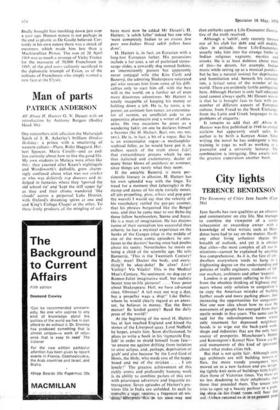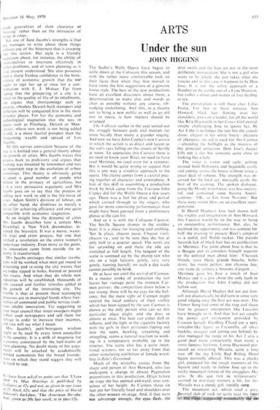City lights
TERENCE BENDIXSON
The Economy of Cities Jane Jacobs (Cape 38s) - • Jane Jacobs has rare qualities as an observer and commentator on city life. She manages to combine the viewpoint of a corner tobacconist or sweetshop owner with a knowledge of what writers such as Hero. dotus have had to say on the matter. Hardly any other living urbaniste shares this breadth of outlook, and yet it is obvious that cities—the most complex of all our in- stitutions—cannot be explained by anything less comprehensive. As it is, the fate of city- dwellers everywhere tends to hang to a frightening degree on the understanding and policies of traffic engineers, students of lab- our markets, architects and other 'experts'.
London is at present suffering in this way from the obsolete thinking of highway engi- neers whose only solution to congestion is to copy the American mistake of building further roads and more parking places, thus increasing the opportunities for congestion. Not one new idea about how to ease the movement of people has emerged from their sterile minds in five years. The same can be said for the redevelopment teams whose only treatment for depressed neighbour- hoods is to wipe out the back-yard work- shops and industries that are the only local source of prosperity. Manchester's Halle and Kensington's Kensal New Town are the arid monuments of this kind of ignorance about what makes cities tick. But that is not quite fair. Although stone age architects are still building towers of flats, the .more trendy youngsters have moved on to a new fashion and are design- ing tightly-knit nests of buildings little higher than those of Victorian times. Yet these are no less deadening to their inhabitants than those that preceded them. The tenant who tries to open up a beauty parlour or a print- ing )slibp..ita‘his &oat room will bear that ouf.\Urban renewal as it is.-atipresent prao,
crude generalities of slum clearance or mousing' rather than on the intricacies of living in cities.
Yet one of Jane Jacobs's strengths is that she manages to write about these things %%ithout any of the bitterness that is creeping into this review. Her style is a friendly scepticism about, for instance, the ability of municipalities to intervene effectively in urban problems, and of town planning as it is at present understood. She also possesses such a sharp Yankee confidence in the bene- %olence of economic growth that the BBC ought to sign her up at once for a con- frontation with E. J. Mishan. Far from feeling that the prospering of a city is a threat to the quality of life of its inhabitants, she argues that shortcomings such as poverty, obsolete Detroit-built transport and pollution will be conquered first in the most dynamic places. For her the economic and technological stagnation that she sees in places such as Pittsburg, Detroit or Man- chester, where new work is not being added to old, is a more fearful prospect than the burgeoning wealth and spread of Los Angeles.
All this carries conviction because of the say it is knitted into a general theory about the growth of cities. Mrs Jacobs traces this process back to prehistory and argues that farming was invented by townsmen and was an important step in the evolution of urban economies. This theory is obviously going to upset a good number of people who believe in the primacy of agriculture, but it is a very persuasive argument; and Mrs Jacobs goes on to say that the process of adding new work to old is the life-force of cities. Adam Smith's division of labour, on the other hand, she dismisses as merely a device for achieving efficiency and one quite compatible with economic stagnation.
As an insight into the dynamic of cities Mrs Jacobs describes how a certain Mrs Rosenthal, a New York dressmaker, in- vented the brassiere. It was a messy, waste- ful, trial and error process, but one that worked a revolution on the entire women's underwear industry. Even more to the point, the innovation came from outside the in- dustry it transformed.
Mrs Jacobs envisages that similar revolu- tions will be worked when men get round to processing and re-using the city wastes that are today tipped in holes, burned or poured into rivers. And when they do whole new industries will be established, thousands of jobs created and further stimulus added to the growth of the innovating city. The trouble is that at present these scavenging Processes are in municipal hands where hier- archies of command and public service tradi- tions inhibit innovation. Try suggesting to your local council that street-sweepers might collect used newspapers and sell them for salvage in order to increase their incomes, and you will see what I mean.
Mrs Jacobs's petit-bourgeois wisdom ought to be read by every town councillor in the country. It is a milk of magnesia for a country constipated by the half-truths of town planning. No doubt many of her argu- ments will be attacked by academically minded economists but the broad founda- tions on which they stand suggest they will be hard to sap.
ll'e have been asked to point out that 'Ulster 1969' by Max Hastings is published by Gollancz at 42s and not, as given in our issue of 25 April, 62s; and that ►he price of David Johnson's Jackdaw, 'The American..Rievolu- lion., given as 20s last week, is in Itict11231



































 Previous page
Previous page